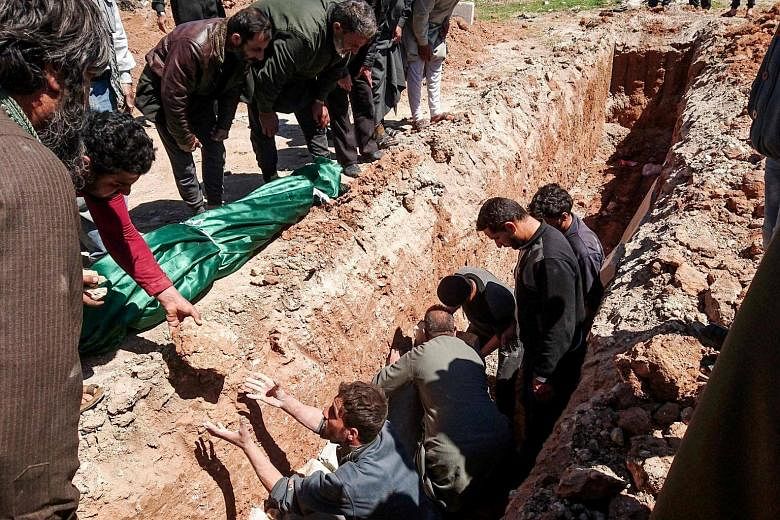REYHANLI (Turkey) • After an air strike on his village, a Syrian farmer hurried to rescue the initial victims of the attack, the residents of a one-storey home.
But as Mr Mohammad Nejdat Youssef neared the site, he ran headlong into what he described as "a winter fog - not quite yellow and not quite white".
He started to lose his balance, he said. His eyes began to sting. His nose started to stream. Finally, Mr Youssef said, he started to foam at the mouth.
Mr Youssef had been poisoned, one of the victims of Tuesday's chemical attack in northern Syria, one of the deadliest chemical weapons attacks in years in the country which killed dozens of people.
A tall and burly man, Mr Youssef, 23, was able to recover after being treated locally.
But when the toxic cloud that had sickened him was blown downwind towards his farm outside the village, his pregnant wife, 20, and a nine-year-old nephew had a far more serious reaction and were evacuated by ambulance to a hospital in Turkey, said Mr Youssef, who accompanied them.
At the hospital in Reyhanli, a small Turkish border town that took in many of the victims, the mourners gathered outside mostly came from just two extended families, Mr Youssef's and the Abu Amash family. The families are connected by marriage and both come from Khan Sheikhoun, the village in rebel-held Idlib province that residents said had been hit with chemical weapons earlier that morning.
"Just look at this!" said Mr Orwa Abu Amash, 33, holding up his phone. On the screen was a long WhatsApp message that he said contained the names of 46 relatives who had died that day in Khan Sheikhoun.
Earlier on Tuesday, witnesses reached by phone in Syria described similarly traumatic scenes at the site of the attack.
Warplanes had roared overhead just before 7am, when many people in the town were sleeping after a night of intense sounds of bombing, said Mr Othman al-Khan, an activist in Khan Sheikhoun who was reached via phone at a first aid station.
-
Raids on strategic town
-
The town of Khan Sheikhoun sits at a crossroads between the Syrian provinces of Hama and Idlib, at the front line of the conflict between President Bashar al-Assad's regime and opposition forces.
It is situated on a strategic motorway and is considered vital to any regime offensive towards Idlib, one of the last bastions of rebel control in Syria, reported The Guardian.
Idlib, in north-western Syria, is a key battleground between the regime and rebels, reported The Independent.
The raids in Khan Sheikhoun indicated Mr Assad's growing confidence, having wrested control of swathes of territory from the rebels in recent months, with the backing of Iran and Russia, reported The Guardian.
The rebel-held area's Minister of Health Mohamad Firas Al-Jundi said in an online video that hospitals and clinics were overwhelmed. He said he had been in a field hospital at 7.30am, when more than 100 people arrived injured or sickened.
Many others, he said, were sent to other clinics, with some left lying in the corridors.
Symptoms, he said, included suffocation, fluid in the lungs with foam coming from the mouth, unconsciousness, spasms and paralysis.
"It is a shocking act," he said. "The world knows and is aware of what is happening in Syria, and we are ready to submit evidence to criminal laboratories to prove the use of these gases."
Rebel fighter Yasser Sarmani, who was reached by phone in Idlib, said he collapsed while riding to the scene on his motorcycle to help the victims.
"Driving against the wind, my eyes started burning and I felt I was being suffocated. People were running away from the site and falling on the ground. It was a cruel scene. At that point, I fainted," he said.
He said he woke up an hour later at a clinic, after receiving injections and oxygen. "Kids were all over the floor, some dead and others struggling to breathe," he said. "The noise of them trying to breathe was loud, with foam all over their faces."
Shuffling around in the hospital carpark, several of Mr Youssef's relatives buried themselves in their phones, watching the videos of the morning's atrocities over and over.
A man narrating a video of motionless children, lined up as if sleeping, was able to come up with only sentence fragments. "A whole family," he repeated.
Unlike the people around the globe who found these videos on social media, several of those watching them outside the hospital in Reyhanli had witnessed the scenes in real life.
"We have seen so much of this," Mr Abu Amash said. "It is normal. We see this every day. We had six years of it."
As they watched ambulances come and go outside the hospital, Mr Youssef and several of his relatives wondered what US President Donald Trump might make of all this. On Monday, Mr Trump's administration signalled that it no longer saw the departure of President Bashar al-Assad of Syria as a priority. On Tuesday, Mr Assad appeared to be responsible for one of the worst chemical attacks of the war.
Mr Youssef said: "If Donald Trump is happy for this to happen to his own people and his own children, then we are happy to keep Bashar al-Assad."
NYTIMES

